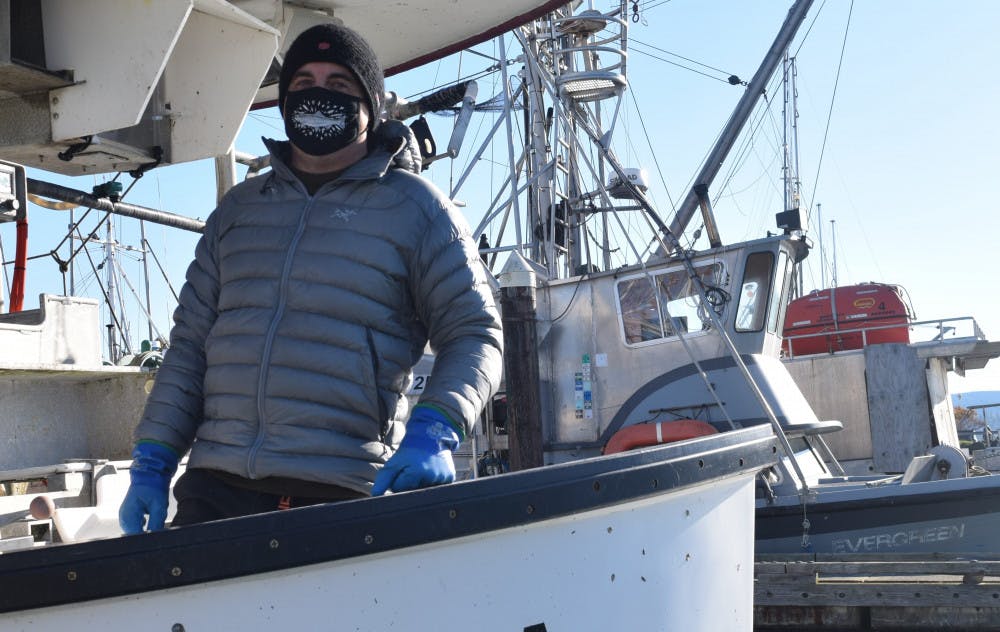Local fishermen are selling straight to you, some for the first time ever

It was cold and windy on Saturday morning, Oct. 24, at Squalicum Harbor’s fifth gate, but that didn’t stop local fishermen from gathering and setting up stalls to sell their catch.
The Bellingham Dockside Market had been discussed on and off for years, and was spurred into motion this summer due to the impact COVID-19 had on fishermen, said Liz Purdy, executive director of the Bellingham Seafeast.
Local fishermen, the Port of Bellingham, the Working Waterfront Coalition of Whatcom County and Bellingham Seafeast combined their efforts to launch the event, according to Bellingham Seafeast’s official website.
“Seafood is primarily consumed in the U.S. in restaurants,” Purdy said. “I think a lot of people started to wonder: ‘How we can support our local waterfront industry?’”
The Dockside Market opened on Oct. 17 and was immediately a success, Purdy said.
“We had tremendous community support, hundreds of people showing up,” Purdy said. “Some said it was the first time they had ever been to the harbor.”
The fishermen selling their catch were also excited about the success of the first day, said Kai Rick, the wholesale manager for Drayton Harbor Oysters.
“We sold out in about two hours,” Rick said.
All the vendors at the market were eager to speak directly with shoppers and tell them about how their food is caught and where it comes from.
“It’s like you caught it yesterday,” said Joel Brady-Power, captain and fisherman of the F.V. Nerka, who was selling salmon pre-orders.
The fish is caught in Alaska and immediately frozen right on the boat, so it stays fresh.
Nerka Sea-Frozen Salmon have been taking pre-orders for the fish they expect to catch in southeast Alaska with Saturday, Oct. 31 being the last day they will be at the market before leaving, Brady-Power said. It is the first time they have sold directly to consumers.
The market’s schedule is expected to vary.
“A market like this isn’t necessarily going to be like a farmer’s market where it’s every week,” Purdy said. “We’re really asking people to ride this dynamic wave with us.”
The best way to find out when the market is and what is available is to follow the market on social media, Purdy said. The Dockside Market has a Facebook page, and the Bellingham Seafeast also posts about the market on its Facebook and Instagram pages.
The fishermen are happy to see that people are ready to come out and support them as well
“As long as Dockside keeps doing this, we will keep coming,” Rick said. “This is awesome.”
Local fishermen from Nerka Sea-Frozen Salmon do more than just catch fish; they also try to protect the environments of the very same fish they catch.
Joel Brady-Power has been fishing aboard the F.V. Nerka since 1982 — when he was 2 years old — and took over the whole business in 2015, inheriting the title from his father, who started the business in 1998.
Brady-Power and the rest of the crew of the F.V. Nerka work with wildlife conservation programs like Salmon Beyond Borders, Washington Wild and the Sitka Conservation Society.
The idea that fishermen want to catch all the fish in the ocean isn’t true, Brady-Power said.
“There are misconceptions about fishermen,” Brady-Power said. “Our livelihood depends on healthy salmon.”
Brady-Power and the Nerka have one main concern: protecting the Tongass Forest of southeast Alaska.
“That’s the fight I’ve been on,” Brady-Power said.
The salmon that grow up in the Tongass Forest are the same ones the fishermen on the Nerka catch and bring back to Bellingham.
“Tongass National Forest is the largest national forest in the country,” said Andrew Thoms, executive director of the Sitka Conservation Society.
The recent focus has been on protecting a roadless rule that has been in place since 2001. The logging and road building that has already begun in the Tongass Forest has the potential to damage salmon habitats, Thoms said.
“Those fishermen spend all their time out in the ocean, but they know how important the forest is,” he added.
Thoms said people who want to help protect the Tongass Forest and the salmon fishery can let their representatives know they buy salmon from the Tongass Forest and care how it’s managed.





